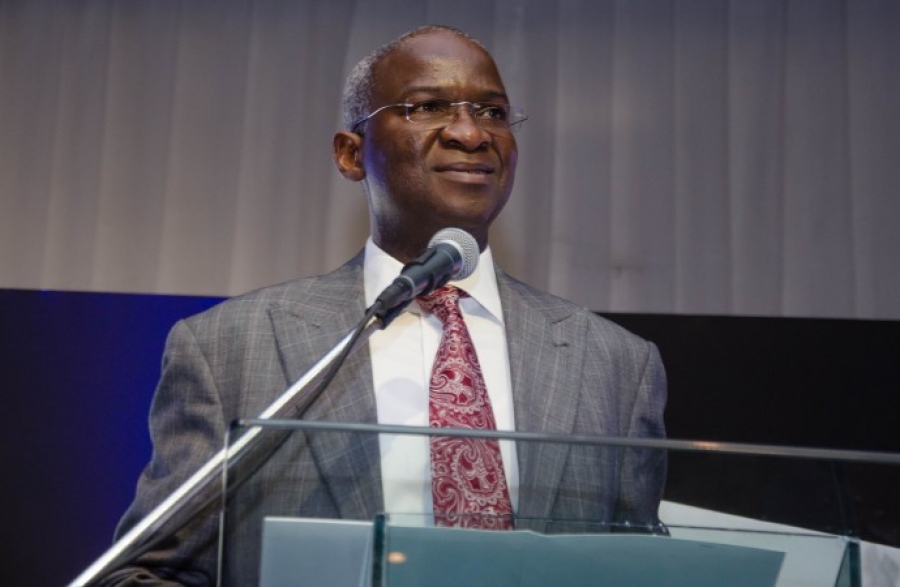- We Owe Contractors N15bn, Yet NASS Reduced Lagos/Ibadan Expressway Budget to N10bn
The Minister of Power, Works and Housing, Mr Babatunde Fashola, has raised alarm over the insertion of projects outside the purview of his ministry in the 2017 Appropriation Act by the National Assembly.
Fashola, a senior advocate, said it was unfair to the Executive arm for the inclusion of such projects after public hearings on the budget and defence of the fiscal estimates by the ministries.
“What I have in my budget now is primary healthcare centres, boreholes,’’ he said at an interactive session with editors on Thursday.
“That was the meeting we had with the Acting President and that was the reason why the budget was not signed on time.
“We were asked to complete those abandoned projects; the budget of Lagos-Ibadan Expressway was reduced by the National Assembly from N31bn to N10bn.
“We are owing the contractors about N15bn and they have written to us that they are going to shut down.
“Also, the budget of the 2nd Niger bridge was reduced from N15bn to N10bn and about N3bn or so was removed from the Okene-Lokoja-Abuja road budget.’’
“Everybody is complaining about power supply but they also cut the budget for Manbila power project and the Bodo bridge that connects the Nigeria Liquefied Natural Gas Station was also cut and all these were also discussed.
“If after we have defended the budget and we had gone and the legislature unilaterally changed the budget, what is the purpose of deliberation?’’
According to Fashola, it is unfair to Nigerians after public hearings were conducted with taxpayers’ money and consultations with the lawmakers only for the budget to be altered, cut or padded.
The minister said that apart from the 200 uncompleted roads he inherited from the previous administration, the lawmakers added 100 roads.
“These roads are not federal roads and some of them do not have designs, how do we award roads that were not designed irrespective of the power you have?
“It is unconstitutional for the National Assembly to legislate on state roads.
“A budget is an estimation plan that set in motion what is to be spent, how much will be borrowed and how much will be collected.
“The executive controls all the machinery for collecting taxes and other revenue with relevant data from the Ministries of Finance, Physical Planning and the Budget Office and others.
“I am not saying that the legislature cannot contribute to the budget, but I hold the view that it cannot increase the budget because they do not collect the revenue with which to run or implement the budget,’’ he said.
Fashola, who held sway as Lagos State Governor between 2007 and 2015, canvassed interdependence and collaboration among the three arms of government rather than independence to ensure a harmonious relationship.
The minister said that without it, the country would not make progress and would be bogged down by the politics of total separation of power and what he called “power of example rather than example of power.’’
“The society benefits more from the power of example and interdependence rather than the example (show) of power; it requires that we show good examples.’’
On the concept of interdependence, Fashola said the President and the Vice-President could not swear themselves into office, but are sworn in by the judicial arm, while the president also proclaims the National Assembly without which it could not start business.
In the same vein, he said the National Assembly confirms ministerial nominees and justices of the courts who are in turn sworn-in by the executive.
He urged the intervention of the judicial arm of government to set the necessary parameters and set things right.
Fashola, however, blamed the electorate for putting pressure on the lawmakers and expecting them to do what was outside their constitutional duties of law-making, representation and oversight.
“There is need for mass orientation and enlightenment for Nigerians not to expect their elected representatives to provide roads, water, light and execute capital projects which is the function of the executive arm.’’


 Naira4 weeks ago
Naira4 weeks ago


 Naira4 weeks ago
Naira4 weeks ago


 Naira3 weeks ago
Naira3 weeks ago


 News4 weeks ago
News4 weeks ago
 Travel4 weeks ago
Travel4 weeks ago




 Naira4 weeks ago
Naira4 weeks ago


 Jobs3 weeks ago
Jobs3 weeks ago
 Naira3 weeks ago
Naira3 weeks ago





















